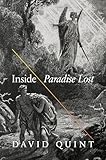Inside Paradise Lost : Reading the Designs of Milton's Epic / David Quint.
Material type: TextPublisher: Princeton, NJ : Princeton University Press, [2014]Copyright date: ©2014Edition: Core TextbookDescription: 1 online resource (344 p.)Content type:
TextPublisher: Princeton, NJ : Princeton University Press, [2014]Copyright date: ©2014Edition: Core TextbookDescription: 1 online resource (344 p.)Content type: - 9780691161914
- 9781400850488
- Epic poetry, English -- History and criticism
- Fall of man in literature
- LITERARY CRITICISM / Poetry
- Abdiel
- Adam and Eve
- Adam
- Aeneid
- Catholic practice
- Chaos
- Charybdis
- Church
- Creator
- De rerum natura
- Death
- Eden
- Epicurean cosmos
- Eve
- Genesis
- God
- Icarus
- John Milton
- Lucretius
- Nicodemus
- Odyssey
- Pandaemonium
- Paradise Lost
- Paradise of Fools
- Phaethon
- Satan
- Scylla
- Sin
- Trojan War
- Ulysses
- War in Heaven
- bad choices
- companionship
- demonic acts
- devil
- divine creation
- divine light
- envy
- epic tradition
- fallen angels
- fame
- heaven
- hell
- heroism
- human idolatry
- human love
- individual recognition
- invisible Creator
- invisible God
- marital love
- military force
- mock-triumphs
- monarchy
- narrative
- oracle site
- pagan rites
- pagan shrines
- paganism
- pilgrimage
- poem
- poetic creation
- poetic flight
- poetry
- power
- rebel angels
- satanic fraud
- social deficiency
- spiritual falsehood
- spiritual sufficiency
- spiritual worth
- symbolic design
- temporal force
- temporal power
- triumphal act
- verse
- vision
- war
- wealth
- 821.4 23
- PR3562
- online - DeGruyter
- Issued also in print.
| Item type | Current library | Call number | URL | Status | Notes | Barcode | |
|---|---|---|---|---|---|---|---|
 eBook
eBook
|
Biblioteca "Angelicum" Pont. Univ. S.Tommaso d'Aquino Nuvola online | online - DeGruyter (Browse shelf(Opens below)) | Online access | Not for loan (Accesso limitato) | Accesso per gli utenti autorizzati / Access for authorized users | (dgr)9781400850488 |
Frontmatter -- Contents -- Acknowledgments -- Introduction -- 1. Milton's Book of Numbers: Book 1 and Its Catalog -- 2. Ulysses and the Devils: The Unity of Book 2 -- 3. Fear of Falling: Icarus, Phaethon, and Lucretius -- 4. Light, Vision, and the Unity of Book 3 -- 5. The Politics of Envy -- 6. Getting What You Wish For: A Reading of the Fall -- 7. Reversing the Fall in Book 10 -- 8. Leaving Eden -- Notes -- Bibliography -- Index
restricted access online access with authorization star
http://purl.org/coar/access_right/c_16ec
Inside "Paradise Lost" opens up new readings and ways of reading Milton's epic poem by mapping out the intricacies of its narrative and symbolic designs and by revealing and exploring the deeply allusive texture of its verse. David Quint's comprehensive study demonstrates how systematic patterns of allusion and keywords give structure and coherence both to individual books of Paradise Lost and to the overarching relationship among its books and episodes. Looking at poems within the poem, Quint provides new interpretations as he takes readers through the major subjects of Paradise Lost-its relationship to epic tradition and the Bible, its cosmology and politics, and its dramas of human choice.Quint shows how Milton radically revises the epic tradition and the Genesis story itself by arguing that it is better to create than destroy, by telling the reader to make love, not war, and by appearing to ratify Adam's decision to fall and die with his wife. The Milton of this Paradise Lost is a Christian humanist who believes in the power and freedom of human moral agency. As this indispensable guide and reference takes us inside the poetry of Milton's masterpiece, Paradise Lost reveals itself in new formal configurations and unsuspected levels of meaning and design.
Issued also in print.
Mode of access: Internet via World Wide Web.
In English.
Description based on online resource; title from PDF title page (publisher's Web site, viewed 30. Aug 2021)


